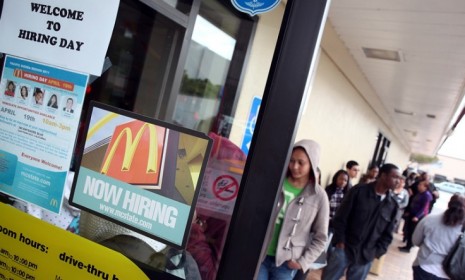Will McDonald's 'super-sized' hiring spree help the economy?
McDonald's hoped to add 50,000 people to its payroll on Tuesday. But are low-paying, burger-joint jobs really what the economy needs?

A free daily email with the biggest news stories of the day – and the best features from TheWeek.com
You are now subscribed
Your newsletter sign-up was successful
McDonald's held its first National Hiring Day on Tuesday, a "super-sized" HR (and PR) campaign meant to add as many as 50,000 people to the fast food giant's payroll — and change the stigma associated with flipping burgers. McDonald's, which employs 1.7 million workers worldwide, emphasizes that 30 percent of its executives started out working lower-level jobs in its restaurants. Sure, unemployment is still high — but does the economy really need more McJobs?
Yes, the recession killed those jobs, too: People without college degrees fared worse than those with diplomas during the recession, says John Challenger, CEO of Challenger, Gray & Christmas, as quoted by the Chicago Sun-Times. The unemployment rate for people with no high-school diploma was 13.7 percent last month — and 9.5 percent for people with just a high-school diploma — compared with the overall national average of 8.8 percent. These low-level jobs can make a big difference to a lot of people.
"Job hopefuls bite on McDonald's hiring day opportunity"
The Week
Escape your echo chamber. Get the facts behind the news, plus analysis from multiple perspectives.

Sign up for The Week's Free Newsletters
From our morning news briefing to a weekly Good News Newsletter, get the best of The Week delivered directly to your inbox.
From our morning news briefing to a weekly Good News Newsletter, get the best of The Week delivered directly to your inbox.
This is a reflection of our weak recovery: "Has the recession turned us into a nation of McWorkers?" asks Annie Lowrey at Slate. Government data about the labor market paints "a fairly bleak picture: The jobs we're adding, for the most part, aren't great ones." The temp industry has shown growth, but that means jobs without benefits or "much income security." And the long-term pattern isn't pretty either, with stable, mid-level jobs being squeezed out. Instead, we're getting "employment polarization," with jobs concentrated "at places like fast food joints and universities — but not a lot of jobs in between."
This could be a stimulus... for McDonald's: The hiring frenzy sure drew a lot of people to the restaurants, says Annie Gasparro at The Wall Street Journal, and that could boost sales, even if just temporarily. "After all, who can turn down a Big Mac once already inside Mickey D’s?"
"McDonald's plan to hire 50K workers: Long lines for Big Macs?"
A free daily email with the biggest news stories of the day – and the best features from TheWeek.com
-
 Film reviews: ‘Wuthering Heights,’ ‘Good Luck, Have Fun, Don’t Die,’ and ‘Sirat’
Film reviews: ‘Wuthering Heights,’ ‘Good Luck, Have Fun, Don’t Die,’ and ‘Sirat’Feature An inconvenient love torments a would-be couple, a gonzo time traveler seeks to save humanity from AI, and a father’s desperate search goes deeply sideways
-
 Political cartoons for February 16
Political cartoons for February 16Cartoons Monday’s political cartoons include President's Day, a valentine from the Epstein files, and more
-
 Regent Hong Kong: a tranquil haven with a prime waterfront spot
Regent Hong Kong: a tranquil haven with a prime waterfront spotThe Week Recommends The trendy hotel recently underwent an extensive two-year revamp